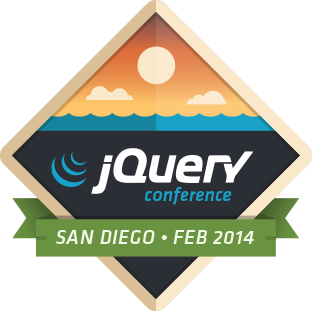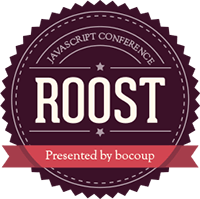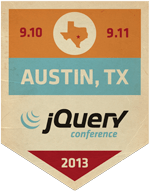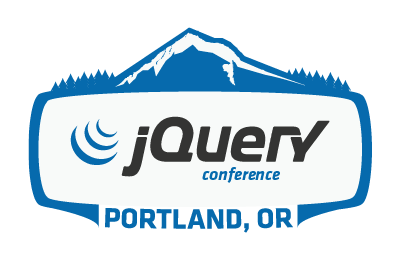With just over a month until jQuery Austin starts, I wanted to take a few minutes to point out the highlight of our conference program: our talks! With a single-track conference, it’s our job to select individual talks that will appeal to the entire conference audience. At the same time, we want to make sure we cover a broad range of subjects related to jQuery and front-end engineering so that every attendee can take home something that will make a difference in their day-to-day development. Those were our goals with our Call for Papers, and we hope you’ll agree our 20 selections fit the bill.
jQuery
One of the main focuses of #jqcon is to bring you the latest on what’s going on in the jQuery libraries, and there’s no one better for that than keynote speakers Dave Methvin and Scott González, development leads for jQuery and jQuery UI. Dave will be talking about more than just recent changes to jQuery core; he’ll be delving into how to diagnose what does (and doesn’t) cause performance woes in modern web apps. And with the jQuery UI and jQuery Mobile projects merging, you’ll want to be sure to hear Scott tell what the future has in store.
As increased modularity comes to jQuery, Timmy Willison will describe how and why we’re making the switch to AMD in core, and how to leverage these forthcoming changes in your apps. Julian Aubourg is going to take a dive into Deferreds and Promises, which have been proven to be a useful tool for managing asynchronous code, even since before their incorporation into jQuery a few years ago.
Mobile
We’re excited to have a number of talks on taming the burgeoning beast that is mobile development. Alex Schmitz will be reviewing the results of the Mobile team’s serious look at the performance of jQuery Mobile for the upcoming 1.4 release, and outline new features that have been added with performance in mind, and Asta Gindulyte will examine how to use jQuery Mobile across a wide variety of screen sizes, from phones right on up to televisions.
Figuring out how to serve the right images to your application’s users across devices and bandwidths has been one of the more interesting discussions in web development for the last year or two, and that’s why we’ve brought Christopher Schmitt to help you make sense of it all. Building applications that work offline is another challenge, and Seth Hallem will explain how to persist, search, update, and display data in HTML5 mobile apps.
Application Development
Debugging is the constant task of software development, and Brian Arnold will be walking us through the constantly-improving tools that can help improve your skills in this dark art. Sometimes, apps appear to work fine until they get into the hands of users who require a screenreader, so Jörn Zaefferer will be giving a primer on the important subject of how to make your web application accessible to all users.
Client-side MVC frameworks are certainly all the rage these days; after having talks on Backbone and Ember at jQuery Portland, we’re thrilled to bring AngularJS into the mix, with Burke Holland bringing you up to speed on directives, one of the framework’s coolest features. If you’ve been using MVC frameworks, one question that you’ve likely wrangled with is where to draw the line between reusable UI widgets and custom application code – which just happens to be one of the subjects Richard Lindsey will be presenting in his discussion of the jQuery UI Widget Factory.
Front-End Ops
Web applications are continuously becoming more JavaScript-centric, bringing increased rigor to the client-side. Grunt has taken off as a popular tool for building and minifying code, and Aaron Stacy‘s talk will explore how to use this JS task runner for even more. Many more developers are recognizing the importance of writing unit tests, and Travis Tidwell will be in Austin to help you incorporate running tests into your deployment process with PhantomJS.
All the technology in the world doesn’t change the fact that web applications are still written by human beings, and Monika Piotrowicz will analyze how we can improve our workflows to better accommodate all the different people who are involved and perhaps even build better products! The jQuery Foundation itself is one organization where we’ve made significant changes to how we work in order to get more developers involved in the project, and Anne-Gaelle Colom will be on hand to detail her experiences as she’s grown to become the Documentation lead for jQuery Mobile.
mind === blown
The open web platform continues to evolve and bring with it exciting new possibilities for what we can do in the browser. Jenn Schiffer will enlighten you on the canvas tag and how it can let you use your coding abilities to be creative and make art, and Vlad Filippov will bring this discussion into a full three dimensions as he shows off voxel.js, a WebGL-based toolkit for creating Minecraft-like worlds and interactive visualizations.
If you’ve got pockets and a phone that vibrates, then you’re surely aware of the utility of push notifications, and Kris Borchers will explain the finer points of their journey to the web platform. Web Components are another emerging spec that have the potential to change how we develop and share reusable widgets, and Juan Pablo Buritica will illuminate the current state of affairs and show tools that will let developers get started writing more modular code today.
Join Us
With so much in store, we hope you’ll head deep in the heart of Texas with us on September 10 and 11! Head on over to the conference site to read more about the program and buy your tickets today. In fact, we’re celebrating the renaissance of our RSS feed with $25 off coupon for anyone who uses the coupon code JQBLOG until we run out of tickets!
If you’re able to attend #jqcon, you’ll probably want to stay within walking distance of the Austin Convention Center in our room blocks at the Hyatt Place and Radisson hotels, especially if you want to be able to explore downtown Austin and rub elbows with your fellow attendees.
If you have any questions, always feel free to get in touch with us on Twitter or via e-mail. If not…see you there!




